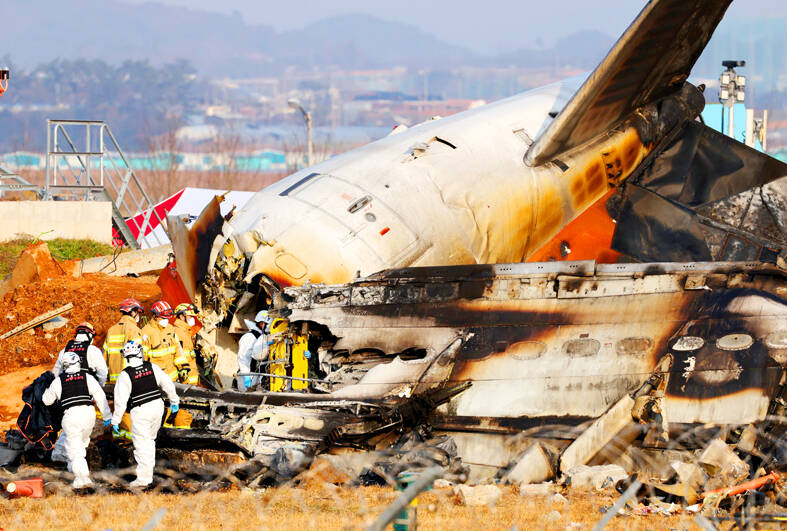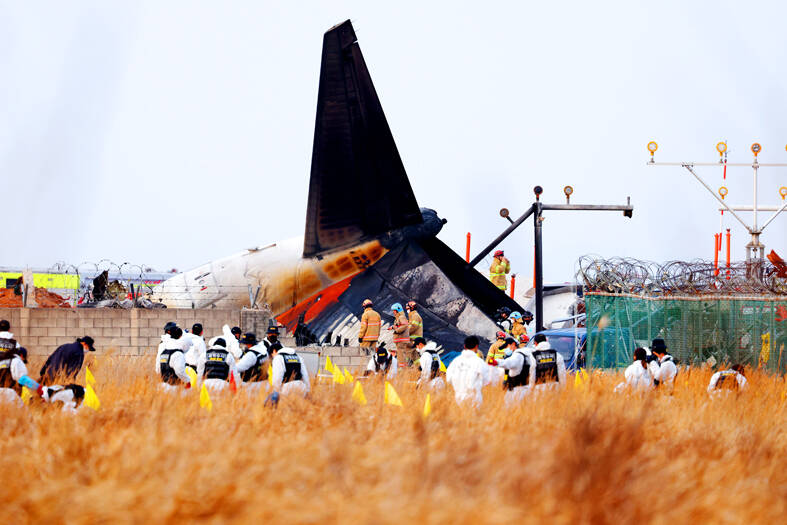At least 177 people were killed yesterday in the deadliest air accident ever in South Korea, where an airliner belly-landed and veered off the runway, erupting in a fireball as it slammed into a wall at Muan International Airport.
Jeju Air flight 7C2216, arriving from the Thai capital, Bangkok, with 175 passengers and six crew on board, was attempting to land shortly after 9am at the airport in the south of the country, the South Korean Ministry of Land, Infrastructure and Transport said.
Two crew members were rescued, and officials have suggested the final two missing people were presumed dead.

Photo: EPA-EFE
The deadliest air accident on South Korean soil was also the worst involving a South Korean airline in nearly three decades, the transportation ministry said.
The twin-engine Boeing 737-800 was seen in a local media video skidding down the runway with no visible landing gear before crashing into the wall in an explosion of flames and debris.
“Only the tail part retains a little bit of shape, and the rest of [the plane] looks almost impossible to recognize,” Muan Fire Department Chief Lee Jung-hyun told a news briefing.

Photo: EPA-EFE
The two crew members, a man and a woman, were rescued from the tail section of the burning plane, Lee said.
They were being treated at hospitals with medium to severe injuries, the head of the local public health center said.
Investigators are examining bird strikes and weather conditions as possible factors, Lee said.

Photo: AFP
Yonhap news agency cited airport authorities as saying a bird strike might have caused the landing gear to malfunction.
Experts said the bird strike report and the way the aircraft attempted to land raised more questions than answers.
“A bird strike is not unusual, problems with an undercarriage are not unusual,” Airline News editor Geoffrey Thomas said. “Bird strikes happen far more often, but typically they don’t cause the loss of an airplane by themselves.”
South Korea’s acting President Choi Sang-mok, in an emergency meeting yesterday evening, declared a national mourning period until Saturday.
Hours after the crash, family members gathered in the airport’s arrival area, some crying and hugging as Red Cross volunteers handed out blankets.
Families screamed and wept loudly as a medic announced the names of 22 victims identified by their fingerprints. Papers were circulated for families to write down their contact details.
One relative stood at a microphone to ask for more information from the authorities.
“My older brother died and I don’t know what’s going on,” he said. “I don’t know.”
Mortuary vehicles lined up outside to take bodies away, and the authorities said a temporary morgue had been established.
Yesterday’s passengers included two Thai nationals, while the rest are believed to be South Koreans, the transportation ministry said.
No Taiwanese were on board, Taiwan’s Ministry of Foreign Affairs said.
The control tower issued a bird strike warning, and shortly afterward the pilots declared mayday and then attempted to land, a South Korean transportation ministry official said.
A passenger texted a relative to say a bird was stuck in the wing, the News1 agency reported. The person’s final message was “Should I say my last words?”
The crash is the worst for any South Korean airline since a 1997 Korean Air crash in Guam that killed more than 200 people, transportation ministry data showed. The previous worst on South Korean soil was an Air China Ltd (中國國際航空) crash that killed 129 in 2002.
In Taipei, President William Lai (賴清德) yesterday expressed his heartfelt condolences on behalf of the government and the people of Taiwan “to the families of those who lost their lives in the crash,” the Presidential Office said in a statement.
Department of East Asian and Pacific Affairs Director Peter Lan (藍夏禮) extended the government’s condolences to South Korean Representative to Taiwan Lee Eun-ho, while Taiwan’s Representative to South Korea Liang Kuang-chung (梁光中) extended the government’s sympathies to Seoul, the Ministry of Foreign Affairs said in a news release.
The Ministry of Foreign Affairs reminded Taiwanese living in or traveling to South Korea to call its representative office in Seoul in case of an emergency at +82-10-9080-2761 or its branch office in Busan at +82-10-4537-7961.
Additional reporting by CNA

ACTION PLAN: Taiwan would expand procurement from the US and encourage more companies to invest in the US to deepen bilateral cooperation, Lai said The government would not impose reciprocal tariffs in retaliation against US levies, President William Lai (賴清德) said yesterday, as he announced five strategies to address the issue, including pledging to increase Taiwanese companies’ investments in the US. Lai has in the past few days met with administrative and national security officials, as well as representatives from various industries, to explore countermeasures after US President Donald Trump on Wednesday last week announced a 32 percent duty on Taiwanese imports. In a video released yesterday evening, Lai said that Taiwan would not retaliate against the US with higher tariffs and Taiwanese companies’ commitments to

Intelligence agents have recorded 510,000 instances of “controversial information” being spread online by the Chinese Communist Party (CCP) so far this year, the National Security Bureau (NSB) said in a report yesterday, as it warned of artificial intelligence (AI) being employed to generate destabilizing misinformation. The bureau submitted a written report to the Legislative Yuan in preparation for National Security Bureau Director-General Tsai Ming-yen’s (蔡明彥) appearance before the Foreign Affairs and National Defense Committee today. The CCP has been using cognitive warfare to divide Taiwanese society by commenting on controversial issues such as Taiwan Semiconductor Manufacturing Co’s (TSMC, 台積電) investments in the

HELPING HAND: The steering committee of the National Stabilization Fund is expected to hold a meeting to discuss how and when to utilize the fund to help buffer the sell-off The TAIEX plunged 2,065.87 points, or 9.7 percent, to close at 19,232.35 yesterday, the highest single-day percentage loss on record, as investors braced for US President Donald Trump’s tariffs after an extended holiday weekend. Amid the pessimistic atmosphere, 945 listed companies led by large-cap stocks — including Taiwan Semiconductor Manufacturing Co (TSMC, 台積電), Hon Hai Precision Industry Co (鴻海精密) and Largan Precision Co (大立光) — fell by the daily maximum of 10 percent at the close, Taiwan Stock Exchange data showed. The number of listed companies ending limit-down set a new record, the exchange said. The TAIEX plunged by daily maxiumu in just

‘COMPREHENSIVE PLAN’: Lin Chia-lung said that the government was ready to talk about a variety of issues, including investment in and purchases from the US The National Stabilization Fund (NSF) yesterday announced that it would step in to staunch stock market losses for the ninth time in the nation’s history. An NSF board meeting, originally scheduled for Monday next week, was moved to yesterday after stocks plummeted in the wake of US President Donald Trump’s announcement of 32 percent tariffs on Taiwan on Wednesday last week. Board members voted to support the stock market with the NT$500 billion (US$15.15 billion) fund, with injections of funds to begin as soon as today. The NSF in 2000 injected NT$120 billion to stabilize stocks, the most ever. The lowest amount it